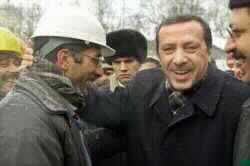Turkish leader Tayyip Erdogan said on Friday that Turkey would hold back from concrete promises of support for a U.S. war on Iraq until initial results of United Nations weapons inspections are clear. The United States is pressing its close NATO ally for a decision on the extent of its support for any war on its southern neighbor and on Friday sent two senior officials to Ankara to discuss the cost of a possible conflict.
Turkey opposes any war and would offer only reluctant support to a conflict it fears could threaten its security and wreck a fragile economic recovery.
Erdogan, leader of the ruling Justice and Development Party (AKP) government, said Turkey would not be hurried into any decision and reiterated Ankara's desire to see U.N. approval for any attacks.
"You would appreciate that the U.N. decision is binding for us due to the signatures we have put on international conventions. Both we and the government say that Turkey will not finalize its position until the U.N. Security Council's decision," Erdogan said in televised remarks.
State Department and Treasury officials Marc Grossman and John Taylor were in talks with Turkish treasury officials on Friday amid media reports that Turkey is seeking guarantees that it will be compensated for the costs of any war.
Turkey says it has lost billions of dollars since the 1991 Gulf War. Southeastern neighbor Iraq was a major trade partner for Turkey before that conflict.
Unconfirmed media reports say Washington has asked for use of Turkish airbases and ports if it goes to war over Iraq's alleged development of weapons of mass destruction.
"The report by the U.N. inspectors about weapons of mass destruction has not been submitted yet," Erdogan said, referring to a planned Security Council meeting on January 27 when chief inspector Hans Blix is due to report on the searches.
"Until (then) I believe what is said now is no more than gossip and mere prediction."
Turkey's cabinet discussed Iraq earlier this week without any firm decision and the influential National Security Council, which groups generals and elected politicians, was expected to address the issue at a meeting on Friday afternoon.
Prime Minister Abdullah Gul's office issued a statement on Friday saying Turkey was still seeking to promote a peaceful solution to the Iraq crisis.
"Our government assigns particular significance to engaging in negotiations with our neighbors and countries in our region about the developments in the region, particularly the problem of Iraq," the statement said.
"The prime minister wishes to be personally involved in the negotiations with countries in the region to evaluate the possibilities of a peaceful solution. The necessary contacts in this respect are being initiated," it said.
Erdogan said earlier this month Gul would travel around the region in a diplomatic push to win over the Arab world to a "coalition" with Turkey behind the United States.
He mentioned Saudi Arabia, Syria, Iran and Egypt but no date has yet been set for such a tour.
PHOTO CAPTION
Leader of Turkey's ruling Justice and Development Party Recep Tayyip Erdogan, right, embraces Turkish worker Zulfikar Boran during his visit to the construction site of a new Turkish trade center in Moscow, Tuesday, Dec. 24, 2002. Erdogan, staying for a two-day working visit, opened a new Turkish trade center in Moscow. Turkey's parliament overturned a presidential veto Friday and opened the way for the ruling party's leader to become prime minister. President Ahmet Necdet Sezer last week refused to sign a constitutional amendment that would allow Erdogan to become prime minister despite a criminal conviction for inciting hatred. (AP Photo/Mikhail Metzel)
- Author:
& News Agencies - Section:
WORLD HEADLINES


 Home
Home Discover Islam
Discover Islam Quran Recitations
Quran Recitations Lectures
Lectures
 Fatwa
Fatwa Articles
Articles Fiqh
Fiqh E-Books
E-Books Boys & Girls
Boys & Girls  Hajj Rulings
Hajj Rulings Hajj Fatwas
Hajj Fatwas














